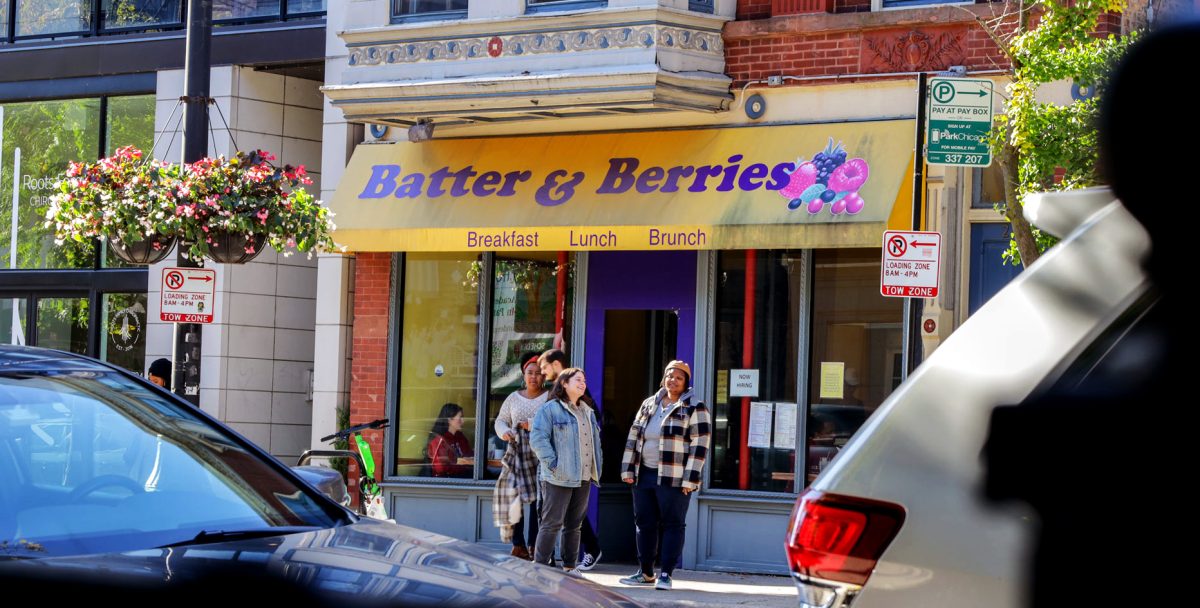Farmers markets line Chicago’s streets and parks, new diets for swimsuit season fill Pinterest boards and refreshing drinks and salads replace chili and hot chocolate on restaurant menus. It’s the season of the vegetarian in Chicago.
The reasons people choose a vegetarian diet vary from health to animal rights to environmental impacts, but it all means no meat. No bacon for breakfast, no turkey on Thanksgiving, no marshmallows in your s’more. While life without a hamburger might seem like a nightmare for some, being a vegetarian seems to be growing in popularity, which makes the diet easier to do and better understood.
Barbara Willard, associate professor and program chair in the College of Communication at DePaul, has been a vegetarian for 25 years, since she read a book about the treatment of factory farm animals.
“I was horrified,” Willard said. “I could not ever, ever eat a piece of meat again knowing that an animal had lived in those conditions.”
According to surveys conducted by the Vegetarian Resource Group, over half of vegetarians cite health reasons as their main incentive. The largest percentage of vegetarians, 42 percent, range in age from 18 to 34 years old.
Aubrie Rizzo, a communication and media major and former vegetarian, explained the preponderance of young vegetarians.
“When I came to DePaul I noticed it was a bigger thing,” Rizzo said. “I think there are a lot of vegetarians here because we are more educated on factory farming, nutrition and the environment.”
With young people making up the largest group of vegetarians, it’s no wonder that Willard has seen the culture around vegetarianism transform since the ’80s.
“It was hard to be vegetarian back then,” Willard said. “If I wanted to get a veggie burger I had to go to a health store, and they were really weird. Now, it’s so easy to be a vegetarian.”
Not only have the times changed, but being in Chicago gives any potential vegetarians a leg up on people in other areas of the country.
Vegetarian restaurants to try in Chicago:
“Here in Chicago there are so many places you can get vegan and vegetarian foods,” Rizzo said. “My favorite restaurant is Native Foods. There are more options for us now.”
As vegetarianism grows in popularity, restaurants are becoming more accommodating, the number of vegetarian events is growing and vegetarian groups are becoming more numerous.
In Chicago, there is a wide array of strictly vegetarian and vegan restaurants. The Chicago Diner, boasting the slogan, “Meat Free Since ’83,” is one of the better-known vegetarian spots. Native Foods, Seoul Vegetarian East and Mana Food Bar are all popular all-vegetarian restaurants.
Even DePaul Dining Services is stepping up to meet the needs of vegetarians on campus. Meatless Mondays is one of the new resources available to students to make a vegetarian diet more feasible, even while on campus.
The culture around vegetarianism is growing in this society of festivals and organic food, vegetarian-friendly events such as the Veggie Pride Parade, Veggie Fest, Chicago Vegan Mania and Greenfest have been gradually popping up over the past few years.
Although vegetarianism is becoming more socially accepted, changing food, one of the most basic areas of life, is not an easy journey.
Willard teaches a course in which students have to engage in an environmental behavior change for one week, and many students choose to try a vegetarian or vegan diet. Their experiences give an insight into what challenges come with taking on a vegetarian diet.
“One challenge is that some people feel a little sluggish because they eat too many carbs,” Willard said. “They don’t know where to get protein. They don’t know to eat legumes, beans, and nuts. They don’t have those go to items that give you that protein boost.”
Rizzo describes the influence of friends and family as another big challenge.
“It was hard to not eat meat because I come from a big Italian family, so that was just not something they understood.” Rizzo said. “The hardest part was that I was the only vegetarian in my group of friends and my mom was the only one in my family. It’s difficult being surrounded by meat all the time.”
Being a vegetarian comes with its challenges, but as Willard explains it doesn’t have to be all or nothing.
“To really go for the long haul and the life practice, you have to build in some flexibility,” Willard said. “For me, there is no room for meat of any kind, but I can see where some people need to be more flexible.”
Tips:
Research: Look into what foods you should eat to be healthy and energetic. While myth has it that vegetarians don’t get enough protein or iron, this isn’t true. A vegetarian diet can be healthy and balanced, but it requires some background information about the different food groups.
Prepare: Plan your meals out for the week and go to the grocery store before committing to a vegetarian diet. Choose easy, quick meals, and ensure they are balanced by doing your research.
Eat more: You might be hungrier than normal because you are drastically changing your diet. Pack snacks for the day to keep your energy level normal.
Food we bet you didn’t know contain meat:
Beer: Some beers, including Guinness Draught, are clarified with fish bladders.
Gummy bears, marshmallows, jello: Most brands of these products contain gelatin, which comes from animals’ bones, connective tissue, and organs.
Refried beans: Many types contain lard, which is pig fat.
Worcestershire sauce: Many types contain anchovies.
Soup: Watch out for what kind of broth is used in your soup. Beef is one of the most popular broths.













